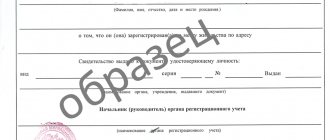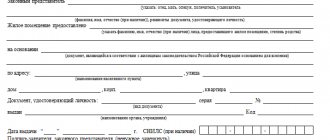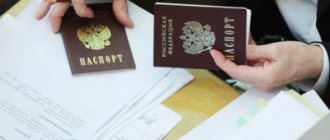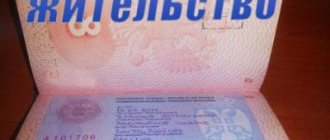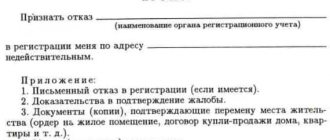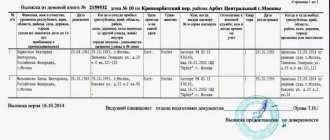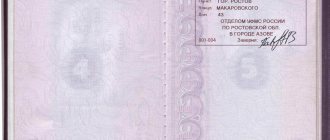Help from a lawyer on this problem
The fine for lack of registration in 2021 is provided for by the provisions of the current civil legislation. The legal concept of “registration” came into use among citizens back in the days of the Soviet Union. In those years, a stamp in the passport certifying the legality of a person’s residence in a given living space was mandatory for all citizens. For the lack of registration, criminal punishment was provided in the form of actual imprisonment.
Since then, much has changed in legal regulations. First of all, registration itself disappeared as a legal term. It was replaced by registration at the address of residence. The criminal article for “vagrancy”, that is, for lack of registration, was also abolished. But, despite the changes that have occurred, Russian citizens are still required to register at their place of residence.
Location
In Russia, a place of residence is understood as a residential property in which a citizen legally resides permanently or primarily. For persons under the age of majority, this place coincides with the place of residence of one of the parents.
If a citizen changes his place of residence, he is obliged to register this with government agencies. If there is no registration at the place of residence, the citizen will face unpleasant consequences, and not only in the form of a fine. If a citizen does not have registration, he does not have the right to use various government services, including education and healthcare. This is also one of the reasons why you need to register in a timely manner (
How quickly do I need to register my newborn?
To register a child, 30 days are given from the date of his birth. If there is no registration, parents may be fined 2-3 thousand rubles.
Registration of children follows a simplified procedure. In particular, there is no need to obtain the owner's consent. Children will be registered at the parents' registration address in any case.
Pregnant women need to take into account that without registration they may not be admitted to the maternity hospital, or the child may not be discharged from the maternity hospital until the mother registers at some address.
Deadline to register
If a citizen changes his place of residence, he is obliged to notify government agencies about this and register within 7 days. If this legal requirement is violated, the citizen will face unpleasant consequences, as a rule, this is a fine for violating the terms of registration, the amount of which will vary depending on the circumstances. Moreover, not only the violator himself will be held accountable, but the owner of the home in which he lived without registration.
If a citizen has arrived at a new address not for permanent residence, the period for registration is 90 days. After this period, you must contact the migration service to obtain temporary registration. Otherwise, the violator and the homeowner will also face a fine.
The obligation of Russians to register
All citizens of the Russian Federation are required to have permanent registration. When moving from one region for long-term residence, it is important to notify FMS employees about the change of residence in a timely manner.
As a rule, only 7 days are allotted for this. Otherwise, the citizen may be held accountable. It should be noted that it will not be possible to live in any region of Russia without registration. After all, then a person will not be able to fully use government services, and many employers are afraid of the Federal Migration Service and do not want to hire workers without registration.
If a person leaves for a short time and plans to return back, then he should obtain a temporary registration at his place of stay.
There is also an important nuance in this case. A Russian has every right to reside in another region for 90 days.
That is, a fine for lack of temporary registration faces only those who live without temporary registration for more than 3 months. Sometimes it happens that a person comes to another city, but he does not have an apartment or real estate with friends where he could register. In this case, you can register in the place where he plans to stay:
- If a person comes for long-term treatment to a sanatorium, it is recommended to talk with the administration about providing temporary registration.
- In almost all major cities of Russia there are hotels where visitors can stay. If you stay in such an institution for more than 3 months, you need to talk to the management of the inn and ask for temporary registration.
- An alternative to a hotel is a hostel. To register in a room, you will need consent from the organization on whose balance sheet the building is located.
- If there is nowhere to register at all, that is, in the city there are no hotels, no boarding houses, no acquaintances with an apartment, no hostels, the only option left is to contact the social welfare authorities. Department employees will find a way out of the situation and provide temporary registration, for example, at a social service center.
Important!
A student studying in another city and living in a dormitory is also required to register there.
As a rule, registration in student “dorms” is provided by default. There is no need to negotiate this with the administration.
Fines for lack of registration at the place of residence in 2021
As a rule, for violation of the terms of registration at the place of residence, citizens face administrative punishment (Article 19.2.5 of the Code of Administrative Offenses of the Russian Federation), but in some cases citizens can also be brought to criminal liability. Moreover, administrative offenses can have quite serious consequences. For example, for citizens of the Russian Federation they may consist of a ban on traveling abroad; for foreign citizens the consequences can be even more serious. In case of repeated violation, a foreign person may be denied an extension of his residence permit in the Russian Federation, or even expelled from Russia.
For the lack of registration at the place of residence, responsibility lies not only with the citizen living without official registration, but also with other persons who are obliged to prevent this violation. Such persons are the owners of the residential property, or officials of the organizations that provided housing. The size of the fine for lack of registration will depend on the category of citizens found to be violators, as well as on the city in which this violation was committed.
Important! The fine for living in an apartment without registration will be 2000 - 3000 rubles. If the violation occurred in Moscow or St. Petersburg, then the fine will be 3,000 - 5,000 rubles. The owner of this apartment will have to pay a fine of 2000 - 5000 rubles, and in Moscow and St. Petersburg 5000 - 7000 rubles.
The fine for an official will be 25,000 - 50,000 rubles, respectively, in Moscow and St. Petersburg - 30,000 - 50,000 rubles. For an organization that provides housing to a violator, the fine will be 250,000 - 750,000 rubles, in Moscow and St. Petersburg - 300,000 - 800,000 rubles.
In addition to penalties for failure to register, there are also penalties that are associated with this violation. The point is that owners of residential premises are required to report that a person without registration lives on their territory. If they do not do this, the penalties will be as follows:
- 2000 – 3000 rubles for the owner of an individual, 3000 – 5000 rubles in Moscow and St. Petersburg;
- 4000 – 5000 rubles for a legal entity, 7000-10000 rubles in Moscow and St. Petersburg.
Why do you need registration in your passport?
Violations and errors in registration issues often arise due to the fact that internal migration policy is regulated by several legislative acts at once.
To avoid an unpleasant situation and proceedings, citizens and persons living in the Russian Federation need to familiarize themselves with the following codes and federal laws:
- Civil Code - contains basic provisions concerning the rights and obligations of citizens, residents and visitors to obtain permanent and temporary registration;
- Administrative Code - establishes the limits of administrative liability, as well as the amount of fines; the document specifies the validity period and procedure for creating a temporary or permanent registration;
- Housing Code - regulates the standards of living conditions for citizens; the code specifies the minimum mandatory standards for the square footage of a dwelling under which citizens are allowed to move into it;
- Family Code - establishes the rights of minors, regulates the rules of residence for children;
- Federal Law No. 5242-1 “On the right of citizens of the Russian Federation to freedom of movement” also contains some registration standards.
Internal migration is quite strictly regulated, since the government is interested in controlling the movement of citizens. Regulation of this issue allows for the preventive resolution of tax violations and property disputes.
Fictitious registration
A foreign citizen must first register to obtain permission to stay in Russia and work. In this regard, fictitious registration is becoming a fairly common violation. In this case, the foreign citizen knowingly submits false information about his place of residence. Particularly enterprising citizens of Russia are trying to make money from this and register up to a hundred people in their apartment. If a fictitious registration is detected, the punishment will be as follows:
- Fine 100,000 – 500,000 rubles;
- Withholding wages (income) for three years.
Requirement for registration
Registration is the presence of a mark in a person’s passport confirming the fact of his permanent presence or stay for a certain period at the appropriate address. At the moment, this term in the legislation has been replaced by the term “registration”, but the first concept is still often used among the people.
Such a mark is in our country a necessary condition for the legal existence of a person at his location. Only if it is available can you perform a whole range of social actions:
- Receive medical care.
- Register your child for preschool.
- Register your child for school.
- Get a job on an official basis.
- Have the opportunity to obtain credits and loans from banking institutions.
- Draw up a number of different documents (agreements, certificates, etc.).
Registration is a necessary condition for the legal existence of a person at his location
Fine for expired registration
In the legislation of the Russian Federation there is no such legal term as “overdue registration”. It is impossible to issue a fine on such a legal basis. After all, it will be very difficult to prove the delay in registration.
However, there are several nuances in this matter. So, if a citizen of the Russian Federation is deregistered at his previous address of residence, then he must register in a new place for 7 days. If the new housing is temporary, then it is necessary to register here within 90 days ( Articles 5, 6 of the Law of the Russian Federation No. 5242-1-FZ )
. However, after “overdue” registration, the legal period does not apply, because the countdown will begin from the day the new tenant moved into the new apartment (private house).
Important!
Thus, if the address of the house where a citizen has moved remains unknown for a long time, it will be impossible to impose a fine for violating the Law of the Russian Federation No. 5242-1-FZ. However, if you still know what address the new housing is located at, registration must be done within 1 week from the date of entry into the apartment (private house). Otherwise, an appropriate fine will be imposed on the offender.
Amount of fine in case of absence of registration at place of residence for more than 7 days
If, after moving to a new home, registration is not issued for more than 7 days, this is considered a direct violation of Law No. 376-FZ. The main amounts of fines are shown in the table below (Article 19.15.1 of the Code of Administrative Offenses of the Russian Federation).
| № | Categories of offenders | Amount of fine |
| 1 | Individual | 2-3 thousand rubles |
| 2 | Tenants, owners renting out their housing to persons without registration | 2-5 thousand rubles |
| 3 | Legal a person (company) providing housing for rent to persons without registration | 250-750 thousand rubles. |
Similarly, for citizens living in St. Petersburg and Moscow, the legislation of the Russian Federation establishes the following amounts of fines:
- individual - 3-5 thousand rubles;
- tenants, homeowners - 5-7 thousand rubles;
- legal face - 300-800 thousand rubles.
Important!
Consequently, if you do not register in your new home on time, you can receive a considerable fine.
Is it possible to appeal a fine for lack of registration in court?
If a citizen without registration believes that he was illegally fined, he has the right to file a claim to cancel the relevant FSSP resolution. The FSSP document comes into legal force within 10 days (Article 122 of RF Law No. 229-FZ).
Important!
When filing a claim to cancel a FSSP decision, it is necessary to refer to the existing laws that were actually violated. Otherwise, the decision of the bailiff service will remain in force, and the offender will have to pay a fine.
Procedure for paying a fine
When law enforcement officers or migration service employees discover a violation, a protocol is drawn up or a resolution is issued. If the issue was resolved in court (in case of forced collection of unpaid fines from the debtor), the decision on administrative penalty is issued by the judicial authority.
The resolution or protocol indicates the details of the payment recipient. The established fine amount must be transferred to these details. You can do this in the following ways:
- directly at a bank branch through a cash desk;
- through payment terminals/ATMs;
- via online banking.
By law, a citizen has 10 days from the date of receipt of the protocol or decision to challenge it in court. If you have documents confirming the unlawful actions of migration service employees, you must, within the specified period, apply to the court with a statement of claim to review this issue. If within 10 days from the date of the protocol the claim is not filed in court, the order enters into legal force and is subject to execution. Voluntary payment of the administrative penalty must be made within two months
On a note! Voluntary payment of the administrative penalty must be made within two months. Within this period, it is necessary to transfer the entire specified amount of the fine. Money is usually transferred to the recipient's account within one business day.
Receipts or checks for payment must be kept for three years, since in the event of controversial issues they will act as documents confirming the payment made. It is not required by law to provide paid receipts to enforcement authorities - information about the paid administrative penalty is automatically received at the destination.
Is it possible to live without registration at the place of residence?
The legislation of the Russian Federation establishes 2 types of registration:
- At your place of residence. In another way, registration is called temporary.
- At residential address (permanent).
When moving to a new apartment (private house), you must contact the passport office within 1 week and leave an application for registration (Article 6 of the Law of the Russian Federation No. 5242-1-FZ). 30 days are given for consideration of the application ( Articles 6, 12 of the Law of the Russian Federation No. 59-FZ ).
Then, the citizen is returned his personal passport, which must have a stamp with permanent registration. A certificate is issued to a minor.
Important!
You can live without registration for a maximum of 7 days (without temporary registration - 3 months). Otherwise, the offender will be fined under Article 19.15.1 of the Code of Administrative Offences.
Who is not responsible
Legislative acts stipulate cases in which persons who fail to register on time are not subject to administrative liability:
- Children, spouses and parents living together;
- Those who do not live by registration within the boundaries of the locality where registration is registered;
- Those who do not live by registration within the borders of the subject of the federation where registration is registered.
These categories of citizens do not violate the law, and any infringement of rights due to missing registration may serve as a reason for legal proceedings.
Fine for an apartment owner who allows citizens to live without registration
Lack of registration is punishable both for the tenant himself and for the tenant and owner of the property who allowed unregistered persons to live.
The amounts of fines for the owner and tenant of housing are shown below in the table (clauses 1, 2 of Article 19.15.1 of the Administrative Code).
| № | Categories of offenders | Amount of fine |
| 1 | Citizens | 2-3 thousand rubles |
| 2 | Company | 4-7 thousand rubles |
| 3 | Individual (in Moscow, St. Petersburg) | 3-5 thousand rubles |
| 4 | Legal persons (in 2 capital cities) | 7-10 thousand rubles |
Important!
The following homeowners are subject to penalties: citizens - owners (tenants) of housing and legal entities. person (company).
Criminal liability for lack of registration
In 2013, by Law of the Russian Federation No. 376-FZ, Art. 322.2, which establishes criminal liability for lack of registration. In accordance with this article, now a citizen without registration can be fined a large sum of money or even put in prison. The main types of criminal penalties are shown in the table below.
| № | Type of criminal punishment | Explanations |
| 1 | Fine | 100-500 thousand rubles, or salary (other monthly income) for 3 years |
| 2 | Sent to forced labor | For 3 years, followed by deprivation of work for 3 years or without it |
| 3 | Deprivation of liberty | For a maximum of 3 years, with or without deprivation of the right to work in your profession for 36 months after release from prison |
Important!
What should citizens whose actions are qualified under Art. 322.2 of the Criminal Code of the Russian Federation? The answer is obvious: to help law enforcement agencies solve a crime under this article. Helping the investigation and not having any other criminal intent in your actions will help you avoid going to jail and avoiding large fines.
Where you will need confirmation of registration
Having registered, a citizen can:
- Visit the nearest clinic to which his address is assigned;
- Claim priority right to enroll a child in a kindergarten or school;
- Get an official job;
- Draw up legal papers in your name (any purchase and sale agreement requires registration information from your passport);
- Borrow money from a bank or financial institution.
Registration is necessary, therefore, for its absence, fines were introduced both for the “hares” themselves and for the owners of the territory.
Typical mistakes on the topic “Fines for lack of registration at the place of residence”
Error:
I recently moved to another city. But I have a permanent residence permit where I was born and raised. Therefore, I do not face fines.
It's a delusion. Only if you live with your family and friends, there will be no fine. Moreover, the relationship will need to be proven. Otherwise, you will be fined 2,000 - 3,000 rubles.
Error:
2 years ago my house was demolished and I moved to a new one in the same village. I still don’t have a residence permit at my new address. However, I still won't be fined for anything.
No, that's not true. Even if the house was demolished, a fine will still be imposed for the lack of registration (Article 19.15.1 of the Administrative Code).
Answers to frequently asked questions on the topic “Fines for lack of registration at the place of residence”
Question:
I sold the apartment and deregistered. I planned to buy a new home immediately after selling the old one. However, at that moment a self-isolation regime was introduced and the bank delayed the execution of the purchase and sale transaction for 21 days. All this time I have not been registered anywhere because I have nowhere to live. Will I face a fine?
Answer:
You will not be fined for lack of registration. After all, it is not your fault that the country introduced a self-isolation regime due to Covid, as a result of which the bank delayed the execution of the transaction. This situation is force majeure.
Question:
I was discharged from the apartment 1.5 years ago. However, I only found out about this today. Will I face a fine for not registering?
Answer:
No, there will be no fine.
After all, administrative punishment is subject to only guilty behavior. Only you will need to document that you did not know about the discharge from your home. Rate the quality of the article. We want to be better for you:
Who, where and how pays the fine
Payment of the fine provided for lack of registration must be made within 60 days from the moment the FMS officer issued a decision or drew up a protocol. The document must indicate the details by which the fine will be paid.
There are three ways to pay the fine:
- In any banking institution. Almost all banks in our country accept payment of administrative fines, and some of them (Sberbank, VTB) do this without additional fees in accordance with the established procedure. After payment, the user will be issued a receipt, which will be proof of the payment.
- Self-service terminal. At the terminals you can also pay a fine for expired registration. However, it should be noted that the user will need to enter all the details independently, and will have to show maximum care so as not to make mistakes. After payment, the user will receive a receipt, which will need to be submitted to the Federal Migration Service as confirmation.
- Using Internet resources. It is also possible to pay an administrative fine online. To do this, you will need to enter the details of the recipient and payer and make the payment. After this, an electronic version of the receipt will appear on the screen, which will need to be printed.

